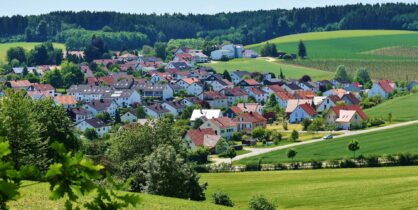Energy Communities in Action
Chris Vrettos, Financing Project Manager of REScoop EU, explains how being part of energy communities can reduce our bills and change our lives.
The energy crisis exposed the exploitative and profit-driven nature of centralised energy systems in Europe. Chris Vrettos, Financing Project Manager at REScoop.eu, the European federation of renewable energy cooperatives, advocates for an alternative model, based on decentralised, sustainable, and clean energy systems, for a transition to energy democracy.
What distinguishes energy communities from large-scale energy projects?
Energy communities are very different from large energy projects in the sense that they are beyond profit. Their primary purpose is social and environmental benefits, not just to maximise as much money as possible for a couple of handfuls of individuals. So really, it’s about creating local renewable energy projects that disseminate benefits to the local community. In fact, studies have shown that local energy projects by energy communities can produce up to two to eight more economic benefits for local communities than a private energy project.
How do energy communities contribute to the EU’s energy transition goals, and what role do they play in achieving a carbon-neutral future?
So, there was this landmark study by the Technical University of Delft in 2016 that showed that 45% of the EU’s electricity needs could be covered by citizens by 2050. In fact, one in two Europeans could be producing their own electricity from energy communities. So, it really shows the outstanding potential for energy communities to contribute to the transition, already with what we at REScoop EU call the second-generation EU legislation of energy communities. It’s a revision of key Fit for 55 files such as the Energy Efficiency Directive, the Renewable Energy Directive, the Energy Performance of Buildings Directive.
Studies have shown that local energy projects by energy communities can produce up to two to eight more economic benefits for local communities than a private energy project.
The Commission challenges, let’s say, urges member states to acknowledge the role of energy communities in all activities of the energy market, agrivoltaics, building renovations, electric mobility, even offshore wind. So really, we are already seeing that, in Belgium in 2025, energy communities will be participating in the first offshore wind tenders in the country. In Ireland there’s One Stop Shops for housing renovations. In Spain there is an app that allows thousands of users to share electric cars. So, the potential is tremendous and it’s across the board really.
How do energy communities address the issue of energy poverty, and what measures are taken to ensure that all citizens have access to reliable and sustainable energy?
Unlike fossil fuel companies, whose primary purpose is to really squeeze out as much profit as possible, we saw that during the energy crisis they made an immense amount of profits off the backs of everyday people, of everyday workers. In fact, they were at the same time subsidised by the states. Only in Greece, where it’s my native country, private suppliers receive €10 billion in subsidies just in the two years of the energy crisis. Energy communities are proposing a new model that goes beyond profit. It goes to serve social and environmental purposes, one of them being tackling energy poverty.
Indeed, we’re seeing very different models in different member states. In France, there is a cooperative supplier called Enercoop. It charges a small solidarity levy on its regular customers and all that money goes into a special fund that supports structural solutions for energy poverty, energy poor households such as housing renovations, energy efficiency advice, housing inspections, buying efficient new electricity, electrical equipment, and so on. In Greece, energy communities are subsidising the free participation of energy poor households in collective self-consumption projects. A similar case is happening with Ecopower, the largest cooperative energy supplier in Belgium.
Really, we’re seeing all sorts of different measures to ensure that energy communities are supported. And one of our key priorities right now looking into the next year will be the Social Climate Fund, a new fund, about €80 billion in worth that’s going to come into place and it’s going to be supporting energy vulnerable households across the EU to escape energy poverty. And we really want to see Member States using that fund to support energy communities to implement such types of actions.
Can you provide a successful example of citizen participation in the energy transition?
There are many, many different examples. Again, I have to refer to my native Greece, because this was also very recent success that we’re still very proud of. CommonEn is an energy community in the north of Greece. It is creating local solar projects for self-consumption. In fact, an area that is threatened by oil and gas drilling and also has a very pristine, biodiverse nature. They’re proposing this more democratic and fair energy transition. They have created, for the past two years, two 100 kilowatt solar projects. And in fact, just this February, they started receiving negative electricity bills, some of their members. So, we really thought, when we uploaded those, those electricity bills on the internet, they went kind of viral because people, you know, they saw the numbers, they really saw the tangible economic impact of what it means to be participating in an energy community. It’s not just an abstract idea of energy democracy. Of course, that sounds great, but what are the concrete results? And we saw that this February. So, it was a very enthusiastic moment for all of us.
